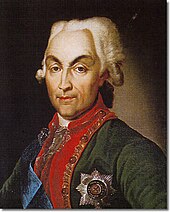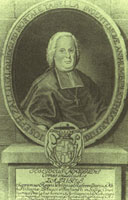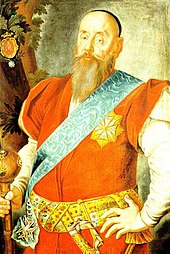Repnin-Sejm



The so-called Repnin-Sejm ( Polish Sejm Repninowski ) was an extraordinary Sejm that met in Warsaw from October 5, 1767 to February 27, 1768 . He decided to lift the restrictions on the civil and religious rights of Protestants and Orthodox in the aristocratic republic of Poland-Lithuania and to confirm the Liberum veto (principle of unanimity) in parliament. In modern Polish historical research, the Sejm was named after the Russian ambassador in Warsaw, Nikolai Repnin , who had a decisive influence on him.
prehistory
At that time, the Kingdom of Poland-Lithuania had about 11.5 million inhabitants, of which about 1 million were non-Catholic. Since the decisions of the Sejm of 1717, 1733 and 1736, these were forbidden to hold public offices (voivode, Starost, etc.) and to practice their religion.
In 1766, the Russian ambassador in Warsaw, Nikolai Repnin, applied to the Sejm on behalf of Tsarina Catherine II and with the support of the Prussian king to restore religious rights for these residents of the aristocratic republic. His application was denied.
Thereupon he supported and promoted the establishment of confederations of Protestants and Orthodox in Toruń and Slutsk . They formulated their demands and passed them on to the Polish king.
A Catholic Confederation of Radom was also formed to support the demands of the dissidents. At the Sejm on August 24, 1767, the ambassador Repnin again applied for a change in Polish legislation, again without success.
Sejm
An extraordinary Sejm was convened for October 5th. Repnin had thousands of Russian soldiers stationed at the gates of Warsaw to back up his demands.
Repnin was aware that a Sejm dominated by the Catholic nobility would vehemently contradict these demands. The Sejm was formally transformed into a confederation . This eliminated the principle of unanimity ( liberum veto ) and simple majority decisions could be made.
Pope Clement XIII. had asked in a letter to contradict the Russian demands. This encouraged leading representatives of the Polish Catholic clergy to express their resistance, among them Bishops Wacław Hieronim Sierakowski of Lviv, Feliks Turski of Chełm, Kajetan Sołtyk of Kraków and Józef Andrzej Załuski of Kiev.
Repnin had the bishops Józef Andrzej Załuski, Kajetan Sołtyk, and the hetman Wacław Rzewuski and his son Seweryn arrested on the night of October 13-14 and sent into exile in Kaluga in Siberia, where they remained for five years.
The delegates were shocked and intimidated. With bribed nobles (including the Primate Poloniae Gabriel Podoski) and the presence of more than 10,000 Russian soldiers in Warsaw, Repnin de facto dictated the terms of this Sejm, even in the chambers of parliament , despite some concerns about the methods he was persuaded to use .
This intimidated Sejm, which met in October 1767 and lasted until February 1768, appointed a commission that drafted a Polish-Russian treaty on February 27, 1768 in the silent Sejm (delegated Sejm without debates). The Sejm also reversed some of the royal reforms of 1764 and ensured that the Polish-Lithuanian political system would be ineffective and easily controllable from abroad. The Liberum Veto , the free choice , Neminem captivabimus , the right to form a confederation or a Rokosz , in other words: all the important, old privileges of the nobility that made the political system ( Golden Freedom ) of Poland-Lithuania so ungovernable became confirmed as unchangeable cardinal rights.
The Repnin Sejm also issued some progressive reforms. Russia, which had used the pretext of granting religious freedoms to Protestants and Orthodox, to destabilize Poland-Lithuania, now had to bring these reforms through the Sejm in order to save face. The Sejm thus granted religious minorities the same status as Roman Catholic residents, and limited some of the privileges of the Catholic clergy. In addition, the penalty for killing peasants was increased from a fine to the death penalty, the liberum veto for Sejmiks was abolished, and a mint was launched. All of these reforms were guaranteed by the Russian Empress Catherine II.
The Repnin Sejm marked an important milestone regarding the Polish dependence on the Russian Empire and its transformation into a protectorate . This dependent position was bluntly explained in Nikita Ivanovich Panin's letter to King Poniatowski, in which he made it clear that Poland was now under the Russian sphere of influence .
The subsequent reaction of the Roman Catholic nobility, which on the one hand rejected the legal equality of Protestants and on the other hand Russia's interference in Polish politics, led to the Confederation of Bar , which was directed against the king on the one hand and Russia on the other, and with a victory for Russia and the First partition of Poland ended.
literature
- Alexander Bronikowski: The history of Poland . Third volume. Dresden 1827 pp. 79-94
- Johann August Christoph von Eine: Attempting a Complete Church History of the Eighteenth Century. First volume. Leipzig 17776. pp. 275-279
- Johann Baptist Schels: Contributions to war history and war science . Third and fourth volumes. Vienna 1829. pp. 153-155
Individual evidence
- ^ The Russian empire, 1801-1917 Hugh Seton-Watson, Oxford, Oxford University Press, 2004,978-0198221524, p. 44
- ↑ Poland's last king and English culture: Stanislaw August Poniatowski, 1732–1798 Richard Butterwick, Oxford, Oxford University Press, 1998, ISBN 978-0-19-820701-6 , p. 169
- ↑ Various, The Story of My Life , Penguin Classics, 2001, ISBN 0-14-043915-3 , Google Print, p. 528
- ^ Letters from prison and other essays Adam Michnik, Maya Latynski, Berkeley, University of California Press, 1987, ISBN 978-0-520-06175-0 , p. 185.
- ↑ Detailed description of the arrest in Alexander Bronikowski: The History of Poland. Dresden 1827. p. 91ff.
- ↑ a b c d e Hamish M. Scott: The emergence of eastern Powers 1756–1775 Cambridge University Press, 2001, ISBN 0-521-79269-X , p. 182.
- ^ Literary activities and attitudes in the Stanislavian age in Poland (1764–1795): A social system? Jan IJ. van der Meer, Rodopi, Amsterdam, 2002, ISBN 978-90-420-0933-2 , p. 142
- ^ Slavonic Europe: a political history of Poland and Russia from 1447 to 1796 Robert Nisbet Bain, Michigan, University Press, 1908, ISBN 978-1-113-46973-1 , p. 387.
- ↑ Frederick the Great: A Historical Profile Gerhard Ritter, Berkeley, University of California Press, 1974, ISBN 978-0-520-02775-6 , p. 189.
- ^ Poland: the Confederation of Bar, 1768–1772 World history at KMLA, 2003, accessed July 13, 2010.
- ^ Hugh Seton-Watson , The Russian Empire, 1801-1917 , Oxford University Press, 1967, ISBN 0-19-822152-5 , Google Print, p. 44
- ^ Richard Butterwick: Poland's Last King and English Culture: Stanislaw August Poniatowski, 1732-1798. Oxford University Press, 1998, ISBN 0-19-820701-8 , Google Print, p. 163
This article includes texts from the Encyclopædia Britannica, eleventh edition, a publication that is now in the public domain.
